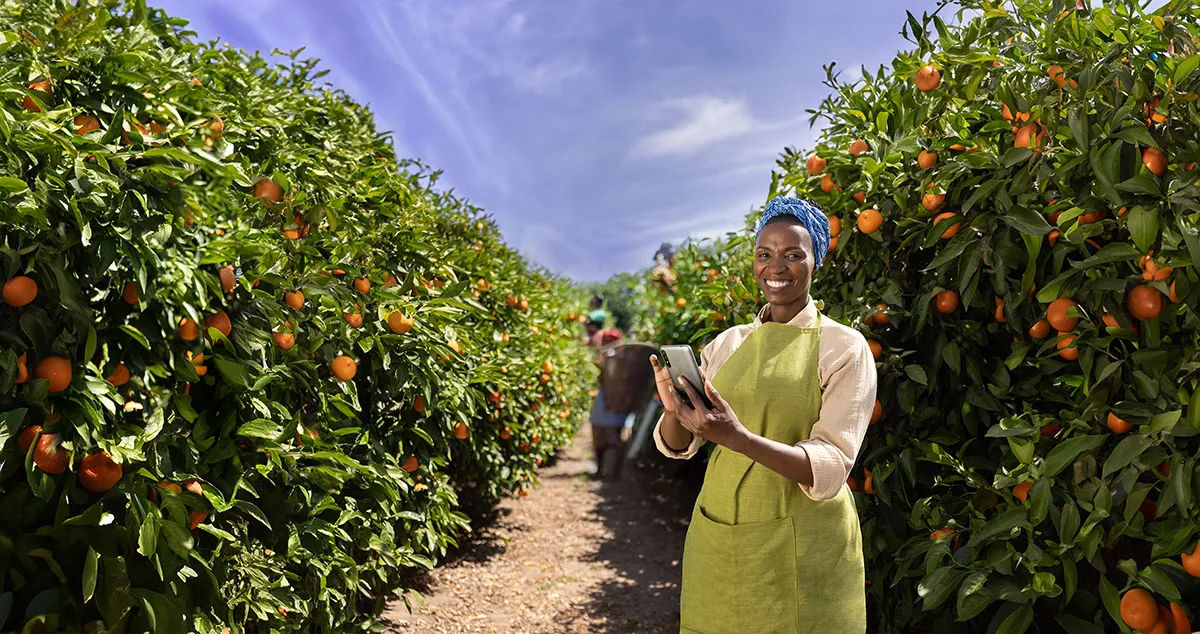This article was produced with the support of Ecobank
By opening up access to market opportunities beyond national borders, this trade agreement can help African businesses expand their production capacity, modernise their business operations, and create more jobs across their supply chains.
AfCFTA, which became operational in 2021, aims to eliminate most tariffs on goods and services traded among African Union member countries while enabling the free movement of businesspeople and capital. According to estimates by the World Bank, the AfCFTA will increase Africa’s income by USD$450 billion, increase intra-African exports by more than 81% and boost the continent’s GDP by 7% by 2035.

However, Souleymane points out that African businesses, notably SMEs, face several challenges in accessing the opportunities that the AfCFTA presents. A significant obstacle holding back SMEs is limited visibility of market opportunities in different countries on the continent. Financing also remains a significant hurdle. Indeed, the International Monetary Fund (IMF) estimates that nearly half of the 40 million SMEs active in sub-Saharan Africa lack access to credit, despite these enterprises accounting for 90% of businesses on the continent and employing 60% of the workforce.
Moreover, a significant number of African SMEs operate in the informal sector, which presents its own unique set of challenges. These enterprises often lack official registration, proper governance structures, and standardised accounting practices, making it difficult to secure loans and investments from formal financial institutions. The informal nature of these businesses also means they are less likely to benefit from government policies and initiatives aimed at supporting SMEs.
Addressing the challenges
Souleymane emphasises that these challenges need to be addressed definitively so that African SMEs can reap the full benefits of the AfCFTA. He reveals that Ecobank is at the forefront of empowering SMEs to overcome these challenges through its Ecobank Single Market Trade Hub. Launched in 2023, this platform connects registered businesses across Africa and allows them to capitalise on opportunities within the unified market created by AfCFTA.
“At Ecobank, we see Africa as more than just a continent, it is home, and we are passionate about continuing to sustainably transform its socio-economic landscape using trade as a key lever,” he said.
“In this quest, Ecobank Single Market Trade Hub is a key contribution to the AfCFTA as a key pillar under the African Union’s Agenda 2063.”
The platform provides valuable insights about the AfCFTA, enables importers and exporters to upload their profiles, and facilitates online matchmaking to enable businesses to find partners. Once a match is made, transactions can be seamlessly concluded using Ecobank’s trade and payment solutions, which are available across 35 African markets.
“Registration is free and open to non-Ecobank clients. The idea is to ensure there’s visibility of products and services across the continent,” Souleymane explains, revealing that over 7500 importers and exporters are profiled on the platform.
“Our vision is simple; leverage our +30 million customer base, unrivalled expertise of the African markets, payment capabilities and unparalleled network advantage to stimulate a truly integrated marketplace where African businesses can connect, access trade opportunities, and contract across 35 African markets,” he said.
Interview with Isaac Kamuta, Group Head: Payments, Cash Management & Client Access at Ecobank
Souleymane expresses pride in the fact that the bank is registering significant growth in the number of successful connections achieved via the platform. “A concrete example comes from Guinea, where Kaba Textile, a textile production company, has benefited significantly from the Ecobank Trade Hub,” he notes.
Sékou Kaba, General Manager of Kaba Textile, shared his experience, stating that he discovered the platform through his relationship with Ecobank Guinea: “I was able to establish a new partnership with Vintage Shop, a clothing retail company based in Guinea. This partnership allowed me to strengthen my resources and achieve a transaction volume of USD$10,000. Through this platform, I hope to develop new partnerships and expand my international relations.”
Souleymane elaborates that the goal is not just to provide visibility for African traders, but to build trust between African businesses and foster greater trade and investment between countries on the continent. To help foster this trust among African businesses, Ecobank has partnered with other like-minded players in African finance, he reveals.
“We’ve also been keen to partner with stakeholders who share our vision and recently collaborated with Afreximbank to interface Ecobank’s Single Market Trade Hub with the MANSA Digital Repository platform,” he notes.
This collaboration allows users of the Ecobank Single Market Trade Hub to access MANSA’s extensive database to conduct effective customer due diligence and know-your-customer checks.
Financing at scale
Souleymane highlights that Ecobank is currently scaling up its financing for SMEs, bolstered by its recent partnership with the African Guarantee Fund (AGF). Last year, Ecobank and AGF signed a USD$200 million risk-sharing facility to enhance the bank’s lending capacity to SMEs, including women-owned enterprises.
This USD$200 million agreement marks the third renewal of Ecobank’s collaboration with AGF. The initial guarantee, provided by AGF in 2013, covered seven countries with a total guaranteed portfolio of USD$50 million. In 2018, the guarantee’s scope expanded to 14 countries, resulting in cumulative disbursements of USD$230 million. The renewed partnership now extends to 27 countries within Ecobank’s African network, offering 50% coverage for qualifying SMEs across all target markets.
This partnership with AGF comes on the back of similar deals with other financial institutions aimed at boosting the bank’s lending to SMEs. “Partnerships with the AGF and other development finance institutions have helped us scale the quantum of financing we provide to SMEs,” Souleymane said. “We have designed long-term credit programs for qualifying SMEs that enable us to structure financing at scale for them,” he explains.
Ecobank Sierra Leone, for example, signed a USD$25 million risk-sharing facility with British International Investment, the UK government’s development finance institution, in October 2024 to help the lender upsize its SME loan book in the country.
Interview with Sebastian Ashong-Katai, CEO of Ecobank Sierra Leone
Commercial banks often require SMEs to provide substantial collateral to secure large loans, a measure intended to mitigate risk. However, this practice frequently disadvantages SMEs, which typically have limited resources. By partnering with Development Finance Institutions (DFIs) through risk-sharing facilities – as Ecobank has done – lenders can effectively manage risk while alleviating the collateral burden on SMEs. This collaboration presents a viable solution for supporting the growth and development of SMEs.

 Sign in with Google
Sign in with Google 



